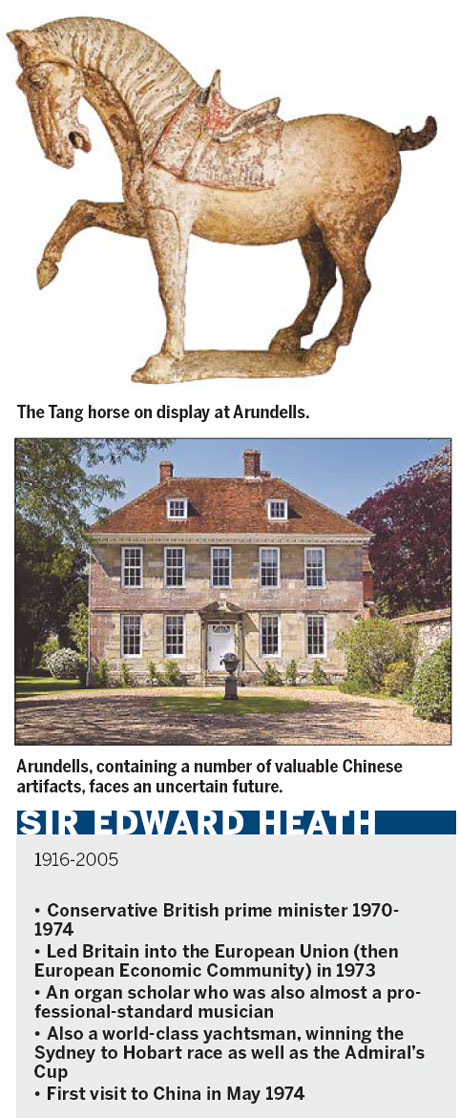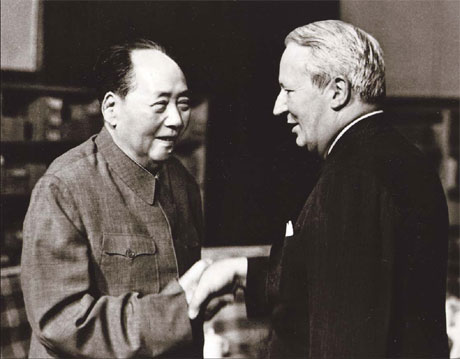Life and Leisure
Heath's hearth
By Andrew Moody (China Daily)
Updated: 2010-12-07 08:06
 |
Large Medium Small |
|
Former British prime minister Sir Edward Heath meets former chairman Mao Zedong on his visit to Beijing in 1974. Photos provided to China Daily |
A Chinese benefactor is being sought to save from closure the home of one of the key figures in China's opening up to the West, Andrew Moody reports
The house of former British prime minister Sir Edward Heath, which has been open to the public for the past two years, could be put up for sale despite being a popular visitor attraction. The property, called Arundells, which is in the center of the English cathedral city of Salisbury and which dates back to the 13th century, contains a number of valuable Chinese artifacts, including a pair of Qianlong vases gifted to Sir Edward by former chairman Mao Zedong on the British ex-premier's first famous visit to Beijing in 1974.
The trustees are seeking permission to sell the house, which could fetch up to 6 million pounds ($9.45 million) since they argue it is losing money.
Yet a campaign group wanting to prevent the house's closure is hoping a Chinese philanthropist, or even an investor, comes forward to save it at the last minute.
Tony Burnside, campaign coordinator of Friends of Arundells, says the house holds a lot of interest to anyone from China.
"We would welcome any support from the Chinese community who would be prepared to underwrite the house. It could take as little as $78,715 to keep the house open for a further two years by which time it could be profitable," he says.
The opening of the house to the public has been a popular success with visitor numbers increasing by more than 60 percent from 8,000 in 2008 to 13,000 this year. In fact, 2,000 had to be turned away this year.
The trustees have applied to the Charity Commission, the body that governs charitable trusts in the UK, to close the house because it is running at a loss despite the visitor numbers.
Because any closure is likely to be contentious, a final decision may have to be made by a tribunal in the New Year.
Two trustees resigned in March over the issue and the remaining five are said to be divided as to what to do.
Stuart Craven, the manager and curator of Arundells, who managed the house for Heath for 20 years until his death at the age of 89 in 2005, said he was confident the trustees would be open to the involvement of a Chinese benefactor.
"If a wealthy Chinese businessman came in, I am sure the trustees would be amenable to that," he says.
Lord Armstrong, chairman of the trustees, agrees he might be open to Chinese involvement.
"I can say no more than much would depend on the nature and extent of the benefaction envisaged," he says.
Heath, who was prime minister from 1970 to 1974, met Mao shortly after losing power and was greeted by several thousand Chinese dancing and waving flags.
Mao felt that was not enough and insisted when Heath left that he was given a full military guard of honor.
"He was really feted by the Chinese despite being leader of the opposition and later only a backbench member of parliament on his return visits to China," says Philip Ziegler, author of Edward Heath, a biography of the former premier published this year.
He made a number of subsequent visits to China, meeting former leader Deng Xiaoping on several occasions and fostering business contacts between China and international companies. He had close links with companies, such as COSCO, China's State-owned shipping and transport company.
Heath had described China as "the country of the future" as early as the 1960s, also saying: "There's something quite exciting about being near the beginning of a great power."
An organ scholar who was also almost a professional-standard musician, Heath was one of very few foreigners to have conducted in the Great Hall of the People in Beijing.
Craven, the manager of the house, says Heath, a lifelong bachelor, would often phone at an appointed time when he was in China.
"He would phone from his hotel in Beijing and ask me what the weather was like in Salisbury. They used to take him to all the best places and treat him as a head of government, which, of course, he wasn't then. He always said he had a fantastic time and that it was lovely there," he says.
One of the key features of the house is the staircase hallway, which is decorated with hand-painted wallpaper made by a Beijing company, depicting the story of Sun Wukong, the Monkey King.
The Qianlong vases, gifted by Mao, have been conservatively valued at nearly $160,000 but could easily be worth several times that given their provenance.
There is also a Tang (AD 618-907) horse, dating back to around the 8th century AD, which was originally acquired at an auction in China.
Burnside says it will be very sad if the house, which employs 25 mostly part-time staff, has to close for good, only to be sold off and stripped of its possessions.
"Sir Edward took great pride in the house and wanted it to remain open to the public. The proposal to close and sell Arundells is highly contentious," he says. "We would like to invite a Chinese entrepreneurial businessman or woman to step forward and help us save this important piece of heritage."

